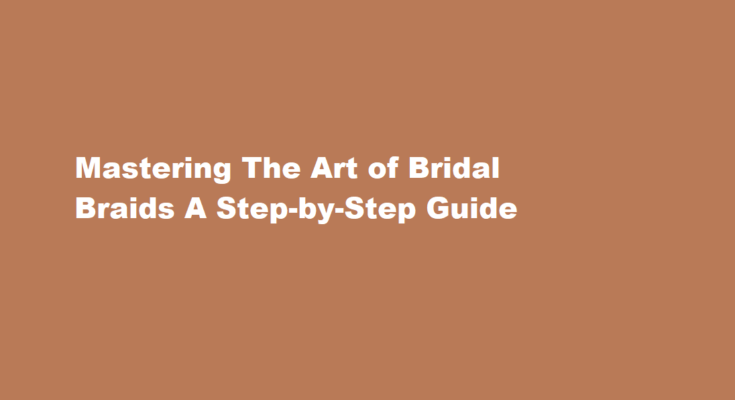Introduction
A bride’s hair is her crowning glory on her wedding day, and braids can add an exquisite touch to her overall look. Braided hairstyles are not only elegant but also practical, ensuring that the bride’s hair stays in place throughout the festivities. In this comprehensive guide, we’ll take you through the process of creating stunning bridal braids that will leave everyone in awe.
- Preparing the Hair – Before diving into the braiding process, it’s crucial to prepare the bride’s hair to ensure it’s in the best possible condition. This includes:
- Washing and conditioning – Start with clean, dry hair. Use a high-quality shampoo and conditioner to make the hair soft and manageable.
- Detangling – Gently detangle the hair using a wide-toothed comb. This will prevent any knots or tangles while braiding.
- Texture and volume – Consider the bride’s hair texture when choosing the type of braid. Fine hair may require more volume, achieved with texturizing products, while thicker hair can be tamed with smoothing serums.
Choosing the Right Braid
There’s an array of braided hairstyles to choose from, and the right one depends on the bride’s personal style, wedding theme, and hair length. Some popular options include
a. Classic French Braid – This timeless style starts at the crown and weaves three sections of hair together, creating an elegant look.
b. Waterfall Braid – A romantic choice, this braid allows hair to cascade gently, with strands falling like a waterfall.
c. Fishtail Braid – This intricate style features two sections of hair woven together, creating a chic, bohemian vibe.
d. Crown Braid – A crown braid encircles the bride’s head, offering a regal and enchanting appearance.
e. Side Braid – A simple side braid can be embellished with flowers, pins, or other accessories to match the wedding theme.
Essential Tools and Products
To create the perfect bridal braid, you’ll need the following tools and products
a. Hairpins and elastics These are essential for securing the braid in place.
b. Hairspray Choose a high-hold hairspray to keep the style in place throughout the day.
c. Hair serum or oil This helps in taming frizz and adding shine.
d. Curling iron or straightener These tools can be used to prep the hair before braiding or to add waves or curls afterward.
Step-by-Step Braiding Process
Now, let’s dive into the step-by-step process of creating a classic French braid, a versatile option for many brides.
a. Start by parting the hair as desired. A middle part or a side part can work well.
b. Take a small section of hair near the parting and divide it into three equal sections.
c. Begin braiding by crossing the right section over the middle section and then the left section over the new middle section.
d. As you continue braiding, incorporate additional sections of hair from the sides into the braid. This is what creates the classic French braid look.
e. Continue braiding all the way down to the nape of the neck, keeping the braid tight and neat.
f. Secure the end of the braid with a hair elastic.
g. To make the braid appear fuller, gently pull on the edges of the braid to loosen it and create a more relaxed, voluminous look.
h. Finish with a spritz of hairspray to set the style in place.
Personalizing the Look
To make the bridal braid unique and reflective of the bride’s style, consider the following customization options
a. Accessories – Incorporate decorative pins, flowers, or a delicate tiara to add a touch of elegance.
b. Veil placement – Coordinate the veil with the braid, deciding whether it should go over or under the braid.
c. Hair jewelry – Delicate jewelry pieces can be woven into the braid for a touch of sparkle.
d. Texture and volume – Depending on the bride’s preferences, you can add volume to the braid or leave it sleek and smooth.
Frequently Asked Questions
What is the difference between plaits and braids?
The hairstyle is typically done on longer hair and has many variations. Now, for those with natural hair, braids can be more intricate and complex while plaits are looser; however, the terms are still used interchangeably.
What are the three types of braids?
The four types of braids are regular braid, fishtail braid, French braid, and Dutch braid.
Conclusion
Creating a beautiful bridal braid is an art that combines skill and creativity. With the right preparation, tools, and technique, you can craft a unique hairstyle that complements the bride’s overall look and wedding theme. Whether it’s a classic French braid, a romantic waterfall braid, or any other style, the key is to make the bride feel confident, beautiful, and ready to say “I do” on her special day. So, embrace the art of braiding and transform the bride’s hair into a masterpiece that will be remembered for years to come.
Read Also : Mastering The Art of Braiding A Step-by-Step Guide to Braiding Your Own Hair



